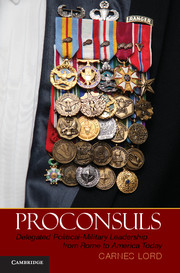10 - Petraeus in the Middle East
Published online by Cambridge University Press: 05 July 2012
Summary
American: “Do you want to kill me?” Iraqi: “Yes. But not today.”
Thomas E. RicksTell me how this ends.
General David PetraeusIt is worth emphasizing again that Iraq in the summer of 2003 differed in fundamental ways from Germany or Japan in the fall of 1945. Both Germany and Japan prior to their defeat at the hands of the United States and its allies had been advanced modern states with populations that were almost completely homogeneous, in ethnic if not religious terms. At the end of the war, the Nazi and imperial Japanese regimes had been comprehensively defeated and were by and large discredited in the eyes of their people; in spite of some fears to the contrary, in neither country did former regime elements or sympathizers attempt to wage guerrilla warfare against the victorious occupiers. The primary tasks facing the occupation authorities were therefore political and economic reconstruction, rather than the provision or maintenance of security. And these tasks were themselves greatly facilitated by the institutional structures that were available for salvage from the wreckage of the relatively developed German and Japanese states and economies.
In the case of Iraq, by contrast, what had once been one of the most advanced countries of the Arab Middle East had been devastated and rendered virtually dysfunctional by some forty years of tyrannical and incompetent government. Much more damage was done by Saddam Hussein to his own country during this time than by all coalition military operations from 1991 to 2003. Furthermore, Iraq was far from being a homogeneous nation. Cobbled together originally by the British out of three provinces of the old Ottoman Empire, Iraq had profound ethnic cleavages – notably, between Arabs and the large Kurdish minority in the north. Most critically, however, it was religiously divided between Sunni and Shi'ite Muslims, the latter making up some 60 percent of the population – a fact of paramount political importance given the fact that Saddam's regime had been sustained largely by the support of the Sunni Arab minority. The Sunni–Shia split was also a profound one, with its roots in an antagonism going back to the first century of the Muslim faith. Finally, it is also important to note the persisting role in Iraqi society and politics of tribal groupings. As we shall see, a belated grasp of the role of the tribes, particularly in the Sunni Arab rural areas, by American military commanders contributed in a decisive way to the turnaround in American fortunes in Iraq on the watch of General David Petraeus.
- Type
- Chapter
- Information
- ProconsulsDelegated Political-Military Leadership from Rome to America Today, pp. 208 - 227Publisher: Cambridge University PressPrint publication year: 2012



